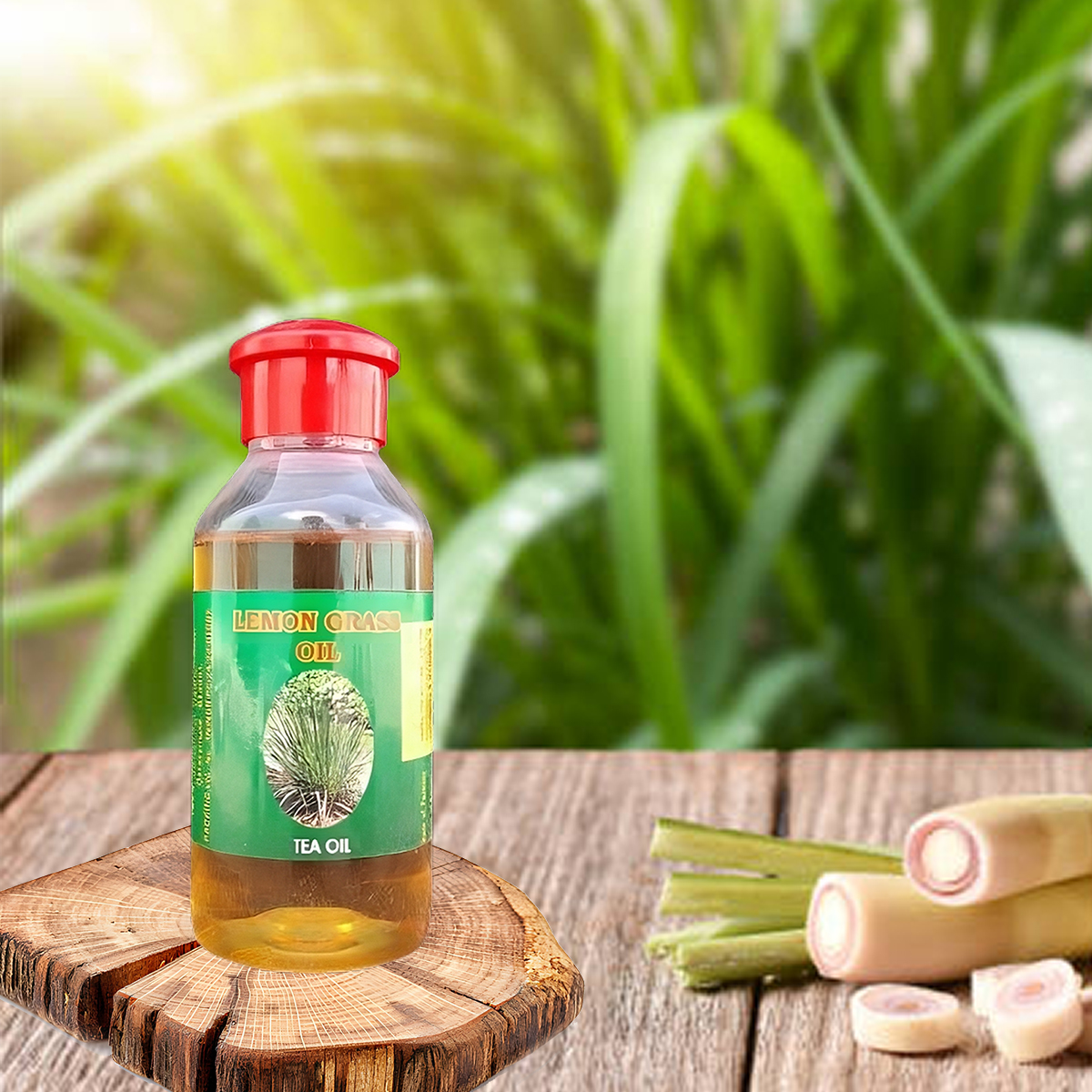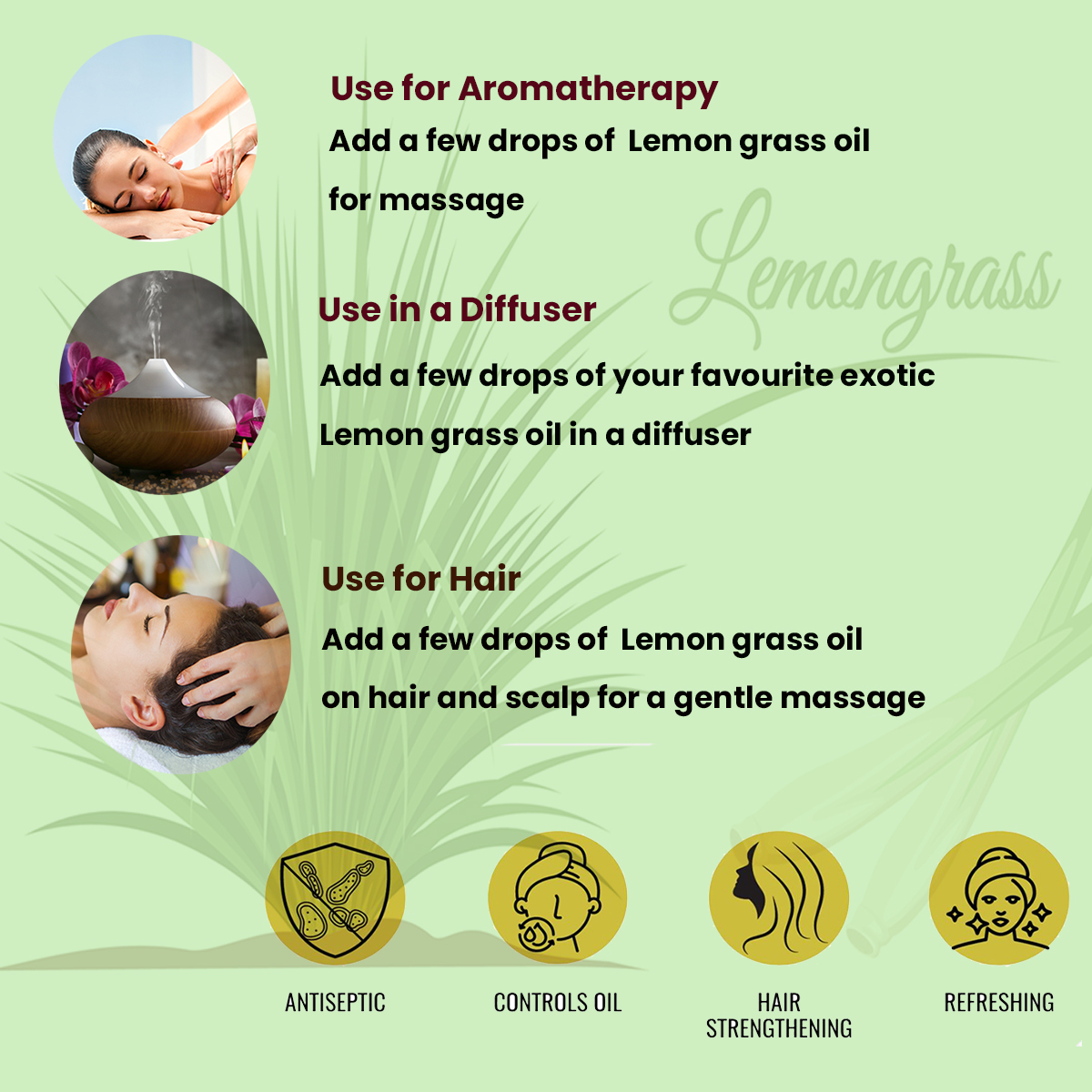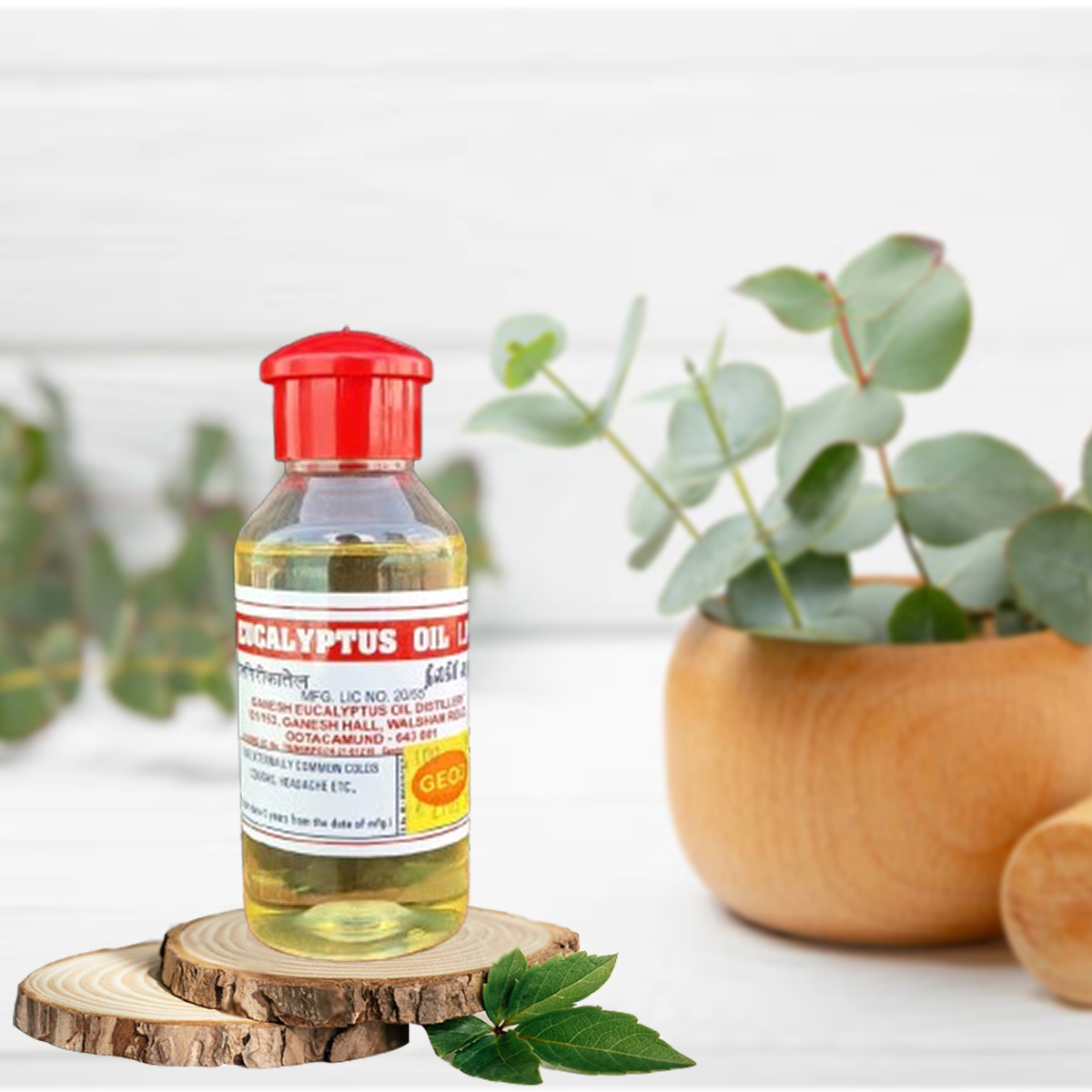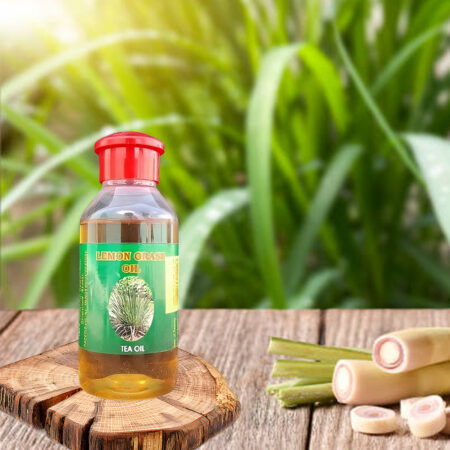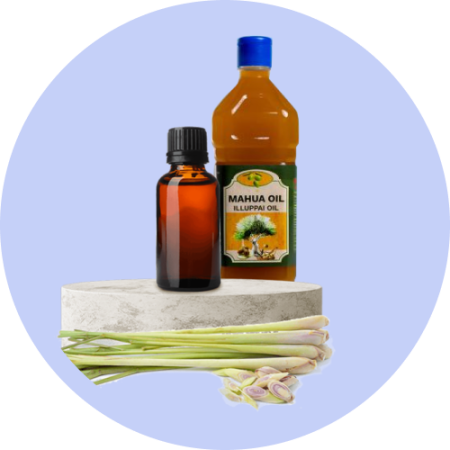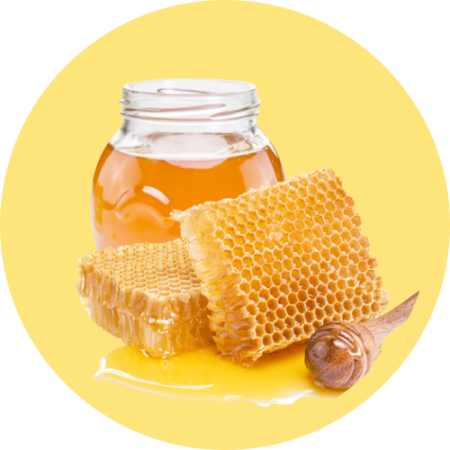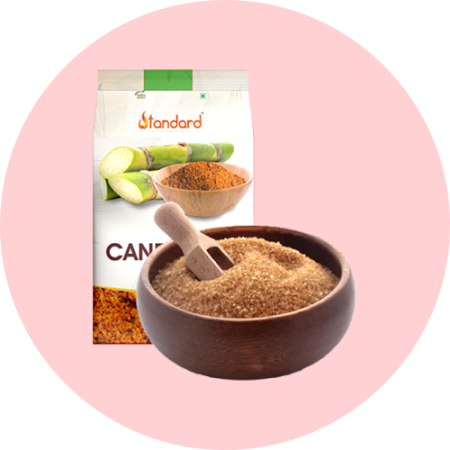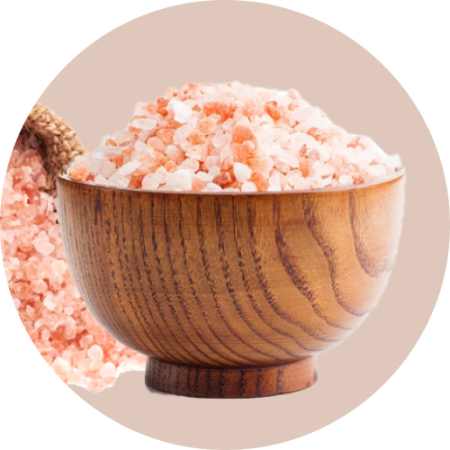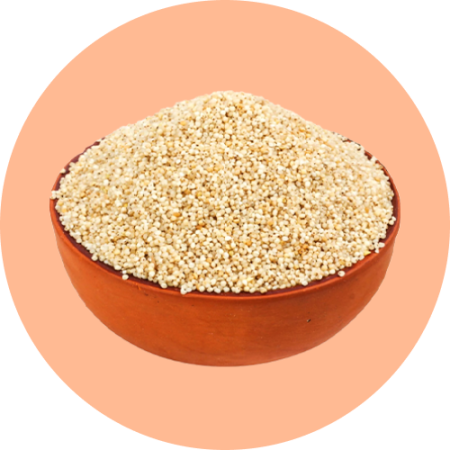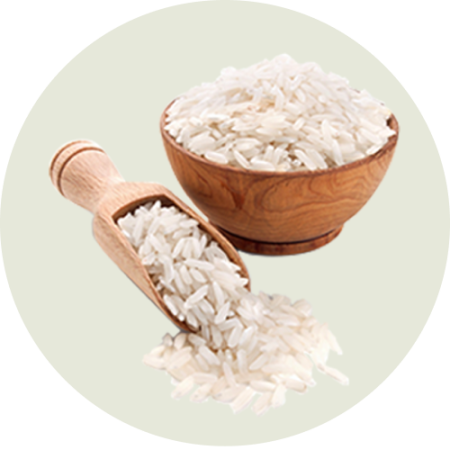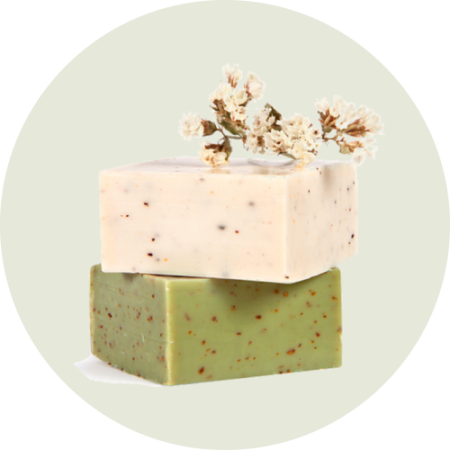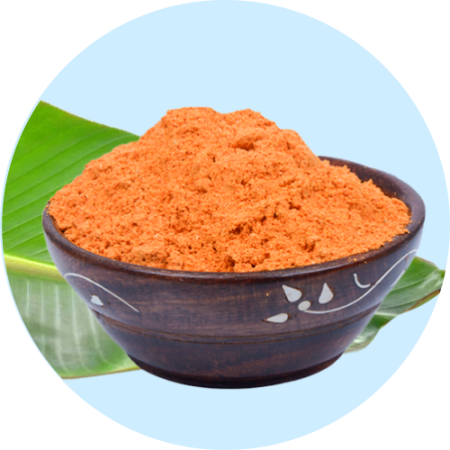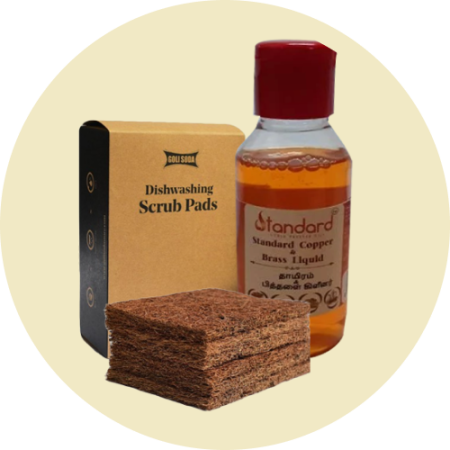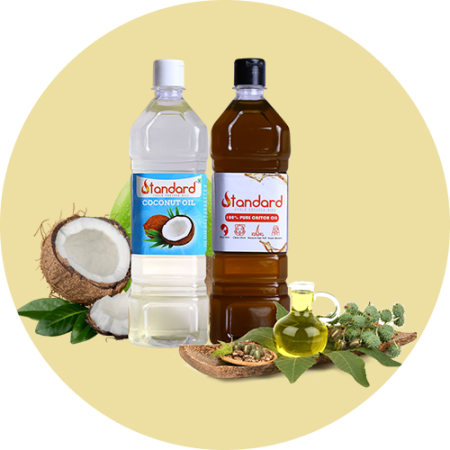Lemon Grass Oil
Weight : 100 mlSave ₹13
(Incl. GST)
Benefits
Soothes
Muscle Pain
Oil
Massage
Menstrual
Cramping
Strengthens
Hair
Order via WhatsApp!
Description
Lemon Grass Oil / Elumichai Pullu Ennai / Neemboo Ghaas Ka Tel / Nimbe Hullu / Nimma Gaddi / Inchipullu Thailam
Benefits:
- Antioxidant properties
- Prevent gastric ulcers
- Antifungal properties
- Antibacterial properties
- Anti-inflammatory properties
- Reduce Inflammation
- Introduction
What if you get a magic oil that lets you cook, that makes you healthy, but all in one single bottle? Wouldn’t you love that? Here is introducing you to Nilgiri Lemongrass Oil, an organic, natural essential oil. Let’s hold on to that thought!
You are probably thinking, what exactly is an essential oil. They are concentrated extracts of plants and mainly capture the essence and flavor of the plant.
Sounds exotic right? The Nilgiri Lemon Grass Oil is extracted from lemongrass (Cymbopogon) through a process of steam distillation. Also known as the “fever grass”, it is an excellent oil to cure fever in both children and adults. That said, now you know one good method to cure fevers right?
Who doesn’t like an earthy, lemony, tarty scent? Our guess is none. If you crush the leaves of this plant, you will get a delightful lemon-like aroma. Mostly found in tropical regions, the uses of Lemon Grass Oil are innumerable. The oil is obtained from the leaves of the plant, hence utmost care is given to prevent them from splitting during harvesting and processing.
Ranging from skin and hair care to culinary to medical, aromatherapies, and cosmetic industry, Lemon Grass Oil become an indispensable part. In hot summers, it is the best oil to cool down the body temperatures and rejuvenate your mind and soul.
Because the concentration levels of the oil are high, they are usually added to a carrier oil like almond oil or olive oil to dilute, thus making it safe for direct use. Undiluted oils might be too strong and can have negative effects.
Nutritional Values of Lemon Grass Oil
Lemon Grass has an amazing nutritional profile.
- Rich sources of minerals like copper, magnesium, potassium, zinc, iron, and calcium.
- Contains small quantities of antioxidants like Vitamin A and C.
- Rich sources of vitamins like B-1, B-5, and B-6.
- Health Benefits of Nilgiri Lemongrass Oil
The multifaceted attributes of an oil find their way into numerous industries and applications. This pale yellow oil is nothing short of a magic potion. Let’s find out what fantastic things a bottle of Lemon Grass Oil can do.
1. Use in skincare
Lemongrass oil is a versatile essential oil that can also be beneficial for your skin. Here’s why lemongrass oil is considered a helpful addition to your skincare routine:
- Purifying properties: Lemongrass oil helps remove impurities and detoxify the skin, leaving it feeling clean and clear.
- Combats acne: Its antibacterial properties can help fight pimple-causing bacteria, making it beneficial for acne-prone skin.
- Balances oily skin: Lemongrass oil acts as a natural astringent, regulating oil production and reducing shine.
- Reduces appearance of pores: It can help minimize the appearance of pores by tightening the skin.
However, there are some important things to keep in mind when using lemongrass oil for skin:
- Never apply lemongrass oil directly to your skin. It’s a potent oil and can cause irritation. Always dilute it with a carrier oil, like jojoba oil, almond oil, or coconut oil, before use.
- Do a patch test before applying lemongrass oil to your face. Apply a diluted solution to a small area of your inner arm and wait 24 hours to see if there’s any reaction.
- Don’t use lemongrass oil if you have sensitive skin or open wounds.
Here are some ways to safely incorporate lemongrass oil into your skincare routine:
- Add a few drops of diluted lemongrass oil to your cleanser or toner.
- Mix a few drops with a carrier oil and use it as a spot treatment for blemishes.
- Create a DIY facial steam by adding a few drops of lemongrass oil to a bowl of hot water. Drape a towel over your head and inhale the steam for a refreshing and cleansing experience.
- Reference from : https://draxe.com/essential-oils/lemongrass-essential-oil/
Remember, consult with your dermatologist before using any essential oil, especially if you have any underlying skin conditions.
2. Use In Hair Care
Lemongrass oil is a popular essential oil that is often used in hair care products. It is extracted from the lemongrass plant, which is native to Southeast Asia. Lemongrass oil has a number of potential benefits for hair, including:
- Promoting hair growth: Lemongrass oil is thought to stimulate hair growth by increasing blood circulation to the scalp. This can help to nourish the hair follicles and promote the growth of new hair.
- Treating dandruff: Lemongrass oil has antifungal and antibacterial properties, which can help to treat dandruff. It can also help to soothe an itchy scalp.
- Conditioning hair: Lemongrass oil can help to condition hair and make it more manageable. It can also add shine and luster to hair.
It is important to note that lemongrass oil is a very potent oil and should always be diluted before use. It is also important to do a patch test before using any new product on your hair, to make sure you are not allergic.
Here are some ways to use lemongrass oil for hair:
- Add a few drops of lemongrass oil to your shampoo or conditioner.
- Mix lemongrass oil with a carrier oil, such as jojoba oil or coconut oil, and massage it into your scalp.
- Add a few drops of lemongrass oil to your hair mask.
3. For Stress and Depression
Citronella, the essential oil in LemonGrass helps reduce stress and calms the body. The pleasant aroma of the oil helps induce sleep, which is essential for curing conditions like depression. Using a Lemon Grass Oil diffuser can help break the oil molecules in the air and give a calming effect.
4 . Reduces Pain from Arthritis
The joint pains caused by arthritis and rheumatism can be reduced with the help of Lemon Grass Oil. It helps relax the muscles and stimulates blood flow in the body.
5. Cure for Respiratory Problems
Vitamin C in Lemon Grass increases immunity and helps fight infections. A few drops of Lemon Grass Oil in hot water can be inhaled to fight conditions like cold, asthma, bronchitis, etc.
6. Reduces Menstrual Cramps
Lemongrass Oil reduces menstrual cramps experienced by women. Applying the oil to the abdomen will provide a calm and soothing effect.
- Purifying properties: Lemongrass oil helps remove impurities and detoxify the skin, leaving it feeling clean and clear.
7. Use as a Detoxifying Agent
Research shows that Lemon Grass Oil induces sweating thus helping in the removal of toxic substances from the body.
8. Reduces Blood Pressure
Lemongrass Oil massages have proved to reduce diastolic blood pressure.
9. A Healthy Stomach
Studies have shown that Eugenol, found in LemonGrass Oil, protects against stomach ulcers and other damages.
10. Use as an Astringent
Lemon Grass oil is said to be a vital source of astringent. It stimulates the contraction of gums, hair follicles, muscles, skin, and blood vessels.
Non-Medicinal Uses of Lemon Grass Oil
● In Culinary
The citrus flavor and aroma of the Lemon Grass oil give its attribute as a culinary ingredient. It is used mostly in Asian cuisines in soups, tea, and curries.
● In Cosmetic Industry
The purifying properties of Lemon Grass Oil make it an effective skin toner. It also helps lighten the skin thus finding its way into soaps, shampoos, body washes, etc. The oil can also be applied on fingers and toenails thus giving a healthy and bright look.
● Natural Insect and Bug Repellant
Chemical insecticides when inhaled are harmful to human beings. Lemon Grass Oil is an excellent product that is natural and organic which helps repel bugs and insects without any toxicity.
● Use in Aromatherapy
The upbeat and healing aroma of the oil makes it an excellent candidate for Aromatherapy. It helps relax the mind and soul and refreshes your body. Want a spa experience at home? Just grab a bottle of Nilgiri LemonGrass Oil, add a few drops of it into warm water and enjoy the comforts of a home spa.
That said, there are a few things to keep in mind while using the product. Few side effects include burning sensation, rashes, and skin irritation. It is highly advised to apply the lemongrass oil with another oil or water to dilute its intensity. Pregnant women and people who take other medication should always consult a doctor for guidance before using it.
Where To Buy Nilgiri Lemongrass Oil
The Nilgiri Lemon Grass Oil is prepared with the utmost care and packaged after a vigorous time-consuming and labor-intensive process to ensure goodness and high quality are delivered.
Think about it. If a bottle of Lemon Grass Oil can do endless wonders, why not enjoy them? Grab yours at the most budget-friendly prices from Here .

Antibacterial and Antifungal Properties:
- Research suggests effectiveness against various bacteria and fungi, including E. coli, Staphylococcus aureus, and Candida albicans.
- Potential applications in disinfecting surfaces, reducing food spoilage, and treating fungal infections
Pain Relief and Anti-inflammatory:
- Preliminary research suggests potential in pain relief and reducing inflammation, particularly for muscle soreness and headaches.
- More studies are needed to understand its exact mechanisms and long-term effects.
- Studies suggest its aroma may have calming and mood-boosting effects, potentially reducing anxiety and stress.


Important Reminders:
- Lemongrass oil is not intended for internal use and can be toxic if ingested.
- Avoid direct contact with skin, as it can cause irritation. Dilute with carrier oils before topical application.
- Seek professional guidance before using for specific health conditions, especially if pregnant or breastfeeding.
Additional information
| Weight | 100 ml |
|---|
Review
Very good indeed. Have reordered and will continue to do so. Advocating to friends.
The Best Buy, I have been using it for more than 10 days now and my skin looks more nourished and soft. This also good to include in your meal. It has very sweet smell
Product quality must be excellent. I am using it for the first time. I think the quality should be 100% pure because I trust Standard cold-pressed oil.
I had bought this product a few months ago and still to finish the 5ltr can, which I use very sparingly (for select dishes). The flavour is excellent, the taste is great
The falvour is great
Lemon Grass is useful for Muscle pain.
Frequently Asked Questions
While some sources suggest lemongrass essential oil can promote hair growth with daily use, it’s crucial to clarify several points for safe and effective application:
- Essential oils are potent and must be diluted before use. Applying undiluted lemongrass oil directly to your skin can cause irritation and sensitization. Always dilute it with a carrier oil like jojoba or coconut oil at a safe concentration (typically 1-2 drops of essential oil per teaspoon of carrier oil).
- Daily use might not be suitable for everyone. While some individuals may tolerate daily use without issues, it’s best to start with a patch test on a small area of skin and monitor for any reactions. Additionally, consult your healthcare provider before using lemongrass oil if you have any underlying health conditions, are pregnant, or breastfeeding.
- Direct application to the scalp isn’t recommended. While diluted lemongrass oil can be used on hair (mixed into shampoo or conditioner), applying it directly to the scalp might irritate sensitive skin. Consider diffusing the oil for an alternative way to reap its potential benefits.
Remember: It’s important to rely on credible sources and prioritize safety when using essential oils. Consult a healthcare professional for personalized advice before incorporating lemongrass oil into your routine, especially for daily use.
A: Some people find lemongrass essential oil helpful for promoting sleep due to its potential calming and anxiety-reducing properties. However, the evidence is mixed and further research is needed to confirm its effectiveness. Here’s what we know:
- Possible calming effects: The scent of lemongrass oil may possess calming properties that could theoretically aid sleep by reducing stress and anxiety.
- Limited research: While anecdotal evidence suggests some individuals find it helpful for sleep, scientific studies investigating its effectiveness specifically for insomnia are currently lacking.
- Alternative methods: Diffusing the oil or adding a few drops to a bath before bed are safer ways to potentially utilize its calming effects than ingesting it (which is not recommended).
Important notes:
- Individual variation: People may respond differently to the oil’s potential calming effects.
- Safety: Never ingest essential oils, including lemongrass. They are intended for topical or aromatic use only.
- Underlying conditions: If you have any underlying health conditions or are taking medications, consult your doctor before using lemongrass oil.
Alternatives: Established sleep hygiene practices and other natural approaches like chamomile tea or relaxation techniques may offer more reliable solutions for insomnia.
Lemongrass oil has shown potential in various areas, but it’s crucial to understand its limitations and use it safely:
Antibacterial properties:
- While research suggests lemongrass oil possesses antibacterial properties, it’s crucial to note:
- Studies typically test concentrations much higher than achievable through safe topical application.
- Never use essential oils like lemongrass to treat infections without medical supervision.
- They should not replace conventional antibiotics prescribed by healthcare professionals.
Other potential benefits:
- Research on other potential benefits, like antifungal and anti-inflammatory properties, is ongoing with varying results. More studies are needed to confirm its effectiveness and safe dosages for specific uses.
Important points:
- Lemongrass oil is concentrated and must be diluted with a carrier oil before use to avoid skin irritation.
- Ingesting essential oils is dangerous and never recommended.
- Consult your doctor before using lemongrass oil if you have any underlying health conditions, are pregnant, or breastfeeding.
Conclusion:
Lemongrass oil has interesting properties, but its effectiveness for various uses requires further research and safe application practices. Always prioritize medical advice and established treatments for health concerns.
Absolutely not! Taking lemongrass oil orally is extremely dangerous and can lead to serious health consequences, including:
- Poisoning: Lemongrass oil is concentrated and toxic if ingested. It can cause nausea, vomiting, abdominal pain, seizures, and even liver or kidney damage.
- Lung damage: Inhaling lemongrass oil directly can irritate your lungs and airways.
- Skin irritation: Although unlikely from oral intake, some people experience skin irritation even from diluted lemongrass oil.
Here’s what you CAN do safely with lemongrass oil:
- Diffuse it: Add a few drops to a diffuser with water to enjoy the aroma’s potential calming benefits.
- Inhale through steam: Add a few drops to hot (not boiling) water and inhale the steam cautiously.
- Use diluted topically: Dilute it heavily with a carrier oil like jojoba or coconut oil (at least 1-2% dilution) for massage or localized application. Always patch test first on a small area of skin.
Remember: Lemongrass oil is a potent substance, and even topical use carries risks. If you have any underlying health conditions, are pregnant, or breastfeeding, consult your doctor before using lemongrass oil in any form.
For health concerns, always prioritize seeking professional medical advice and evidence-based treatments.
While lemongrass oil offers potential benefits, it’s crucial to be aware of its drawbacks and use it safely:
Skin irritation:
- Lemongrass oil is highly concentrated and can irritate the skin, especially when used undiluted. Always dilute it with a carrier oil like jojoba or coconut oil at a safe concentration (typically 1-2% dilution) before topical application.
- Individuals with sensitive skin or pre-existing skin conditions like eczema should be particularly cautious.
- Perform a patch test on a small area of skin before using it over a larger area.
Other safety concerns:
- Never ingest lemongrass oil. It’s toxic and can cause poisoning, leading to nausea, vomiting, abdominal pain, and even organ damage.
- Avoid using it near eyes, mouth, and other mucous membranes. It can cause irritation and discomfort.
- Pregnancy and breastfeeding: Lemongrass oil is likely unsafe during pregnancy as it may stimulate the uterus and potentially cause miscarriage. It’s also best to avoid it while breastfeeding due to limited safety data.
- Drug interactions: Lemongrass oil may interact with certain medications. Consult your doctor before using it if you’re taking any medications.
Additional disadvantages:
- Limited scientific evidence: While some studies suggest potential benefits, many of the claims haven’t been extensively researched and require further confirmation.
- Not a substitute for medical treatment: Essential oils like lemongrass shouldn’t be used to replace conventional medical treatments for any health condition.
Remember:
- Use lemongrass oil responsibly and consult your doctor before using it if you have any health concerns.
- Prioritize evidence-based treatments and professional medical advice for managing health conditions.
By understanding the potential risks and using lemongrass oil cautiously, you can minimize the associated disadvantages and maximize its potential benefits.
Yes, lemongrass can have side effects, especially when used excessively or improperly. Here are some potential issues to be aware of:
Topical use:
- Skin irritation: While rare, some people may experience skin irritation, redness, or allergic reactions when applying lemongrass oil directly to the skin. Always dilute it with a carrier oil before topical application.
Internal use:
- Digestive issues: Consuming large amounts of lemongrass (through tea, supplements, or even excessive food intake) can lead to stomach upset, nausea, vomiting, or diarrhea.
- Increased urination: Lemongrass has diuretic properties, meaning it can increase urine output. While generally beneficial, excessive use might lead to dehydration, especially if not balanced with sufficient fluid intake.
- Dizziness and fatigue: In rare cases, excessive lemongrass consumption might cause dizziness or fatigue.
- Allergic reactions: People with allergies to grasses or other plants might experience allergic reactions to lemongrass, including rashes, itching, or difficulty breathing.
Additional points:
- Pregnancy and breastfeeding: Lemongrass may stimulate the uterus and menstrual flow, so it’s generally not recommended during pregnancy or breastfeeding.
- Drug interactions: Lemongrass could potentially interact with certain medications. It’s crucial to consult your doctor before using lemongrass if you’re taking any medications.
Overall:
Lemongrass is generally safe for most people when used in moderation and appropriate ways. However, it’s essential to be mindful of potential side effects and use it cautiously, especially if you have any underlying health conditions or concerns. Remember, consulting your doctor for personalized advice is always recommended before adding new supplements or remedies to your routine.
Recipes
You may also like…
-
Pure Nilgiri Hills Essential Oils Duo Pack: Eucalyptus & Lemon Grass Oil (100ml each)
₹440Original price was: ₹440.₹420Current price is: ₹420.Save ₹20
(Incl. GST)
1 review
Related products
-
South Indian Cooking Oil Combo Pack: Wooden Cold Pressed Groundnut, Sunflower & Sesame Oil (1Litre each)
₹1,100Original price was: ₹1,100.₹1,049Current price is: ₹1,049.Save ₹51
(Incl. GST)
4 reviews -
Healthy Cooking Oils Trio Pack: Wooden Cold Pressed Coconut Oil, Sesame Oil & Cow Ghee (500ml each)
₹800Original price was: ₹800.₹720Current price is: ₹720.Save ₹80
(Incl. GST)
2 reviews -
Eucalyptus Oil
Weight : 100 ml₹300Original price was: ₹300.₹270Current price is: ₹270.Save ₹30
(Incl. GST)
4 reviews -
Cold Pressed Coconut Oil
₹70 – ₹4,700Place Your COD OrderThis product has multiple variants. The options may be chosen on the product pageOrder via WhatsApp!
120 reviews




